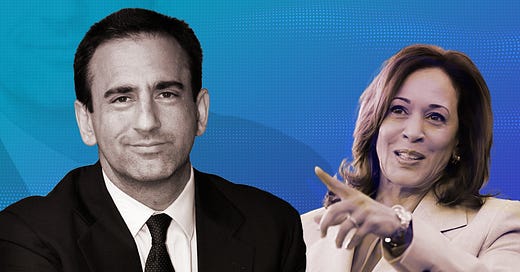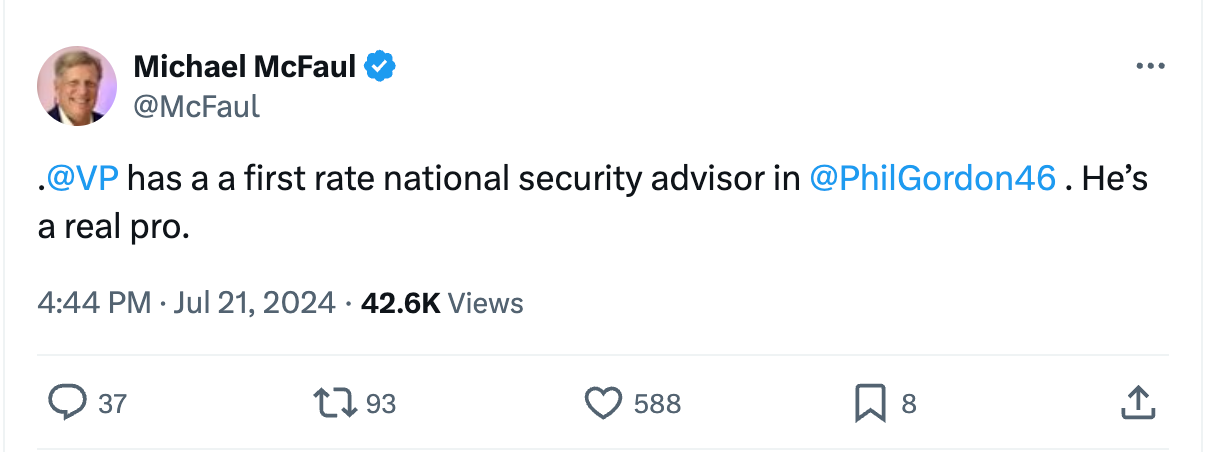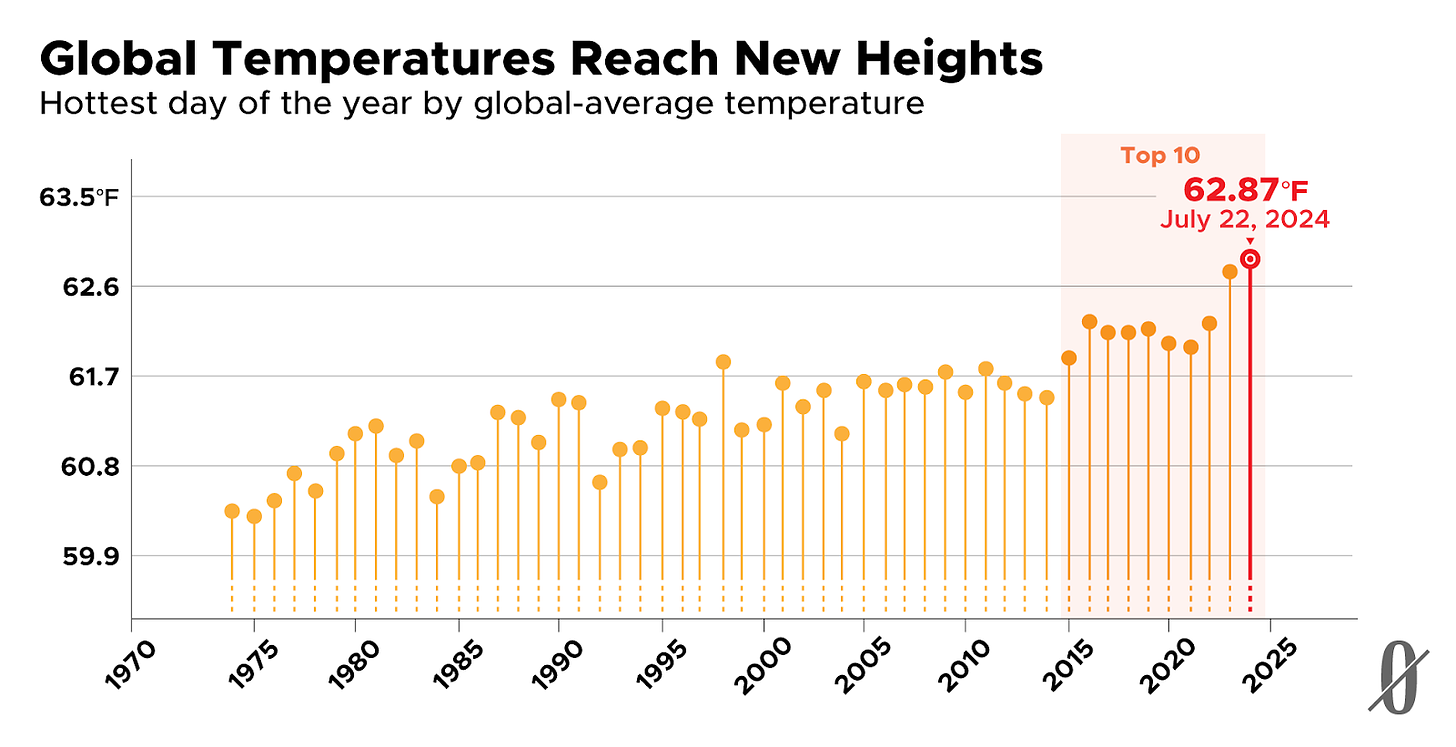Kamala’s Very Good Foreign Policy Guy
Plus: Ukraine peace momentum builds, Biden’s China sanctions backfire, Bibi in DC, nuclear pebbles, hot Earth summer, power-hungry data centers, Zoom call with Bob, and more!
Change of Plans: The Zoom call with NZN members that I’d scheduled for July 31 will, I’m afraid, have to be pushed back a week, owing to an unanticipated development that I should have anticipated. The new date is Wednesday August 7, still at 8 pm US Eastern time. The main topic is still foreign policy, though no one will be banished from the Zoom room for asking about other things. And you can still become an NZN member via this route. I’ll share a link to the Zoom room in next week’s Earthling.
What might the foreign policy of a President Kamala Harris look like? This week brought lots of loose speculation on that question—but also one solid sign of hope for advocates of military restraint.
On Ukraine, China, and the Middle East, Harris’s foreign policy would be more or less a continuation of Biden’s, a piece in Politico suggests. The article paraphrases one former Pentagon and NATO official as saying that Harris “came into the vice presidency with relatively little foreign policy experience, which left her dependent on her advisers, who are largely traditionalists.”
But, actually, “traditionalist” is a misleading term for the adviser considered most likely to replace Jake Sullivan as national security adviser in a Harris administration: Philip Gordon. Gordon, Harris’s top foreign policy aide since 2022, “became an outspoken dissident against the foreign policy consensus” after serving in the Obama administration, writes Matthew Petti of Reason. In 2020, Gordon published a book that condemned America’s decades of regime change wars in the Middle East—wars that, in his view, resulted in “no case of clear success, some catastrophic failures, and universally high costs and unintended consequences.”
Of course, by 2020 it had dawned on a number of people—even some in the very heart of the Blob—that the disastrous outcomes of recent regime change wars raised doubts about their wisdom. But Gordon’s penchant for restraint had shown up earlier than that, and in a particularly illuminating context.
While working in the Obama administration, Gordon was “deeply skeptical of plans to arm Syrian opponents of Syrian President Bashar al-Assad,” according to the Wall Street Journal. Such skepticism appears justified in retrospect. The CIA’s effort to mount a Syrian opposition wound up funneling weapons toward an al-Qaeda ally and encouraging Russia to intervene directly in the conflict. More broadly, the arming of various rebel groups by both the US and its friends in the region fanned the flames of a civil war that has taken more than half a million lives—and, in the end, left the Assad regime in power.
Even today, doubts about Obama’s Syria policy aren’t as commonly expressed as doubts about more overt recent regime change efforts (Iraq in 2003, Libya in 2011). And back when Gordon first voiced doubts about the Syria policy, they were even less common.
Among the people in the Obama administration who supported arming Syrian rebels was Jake Sullivan (as did, apparently, Secretary of State Antony Blinken, who also served in the Obama administration). This may be one reason that foreign policy analyst Esfandyar Batmanghelidj says Gordon would be a “big upgrade” over Sullivan as national security adviser. (The Wall Street Journal reported Tuesday that, according to unnamed officials, Sullivan and Blinken probably “wouldn’t be extended in their current roles.”)
Daniel Larison, a longstanding advocate of military restraint, also had kind words for Gordon: “Gordon has demonstrated that he understands the Iranian government better than a lot of his colleagues, and that could be very useful in reviving negotiations with Iran under its new reformist president Masoud Pezeshkian.”
But if any restrainers are looking for reasons to worry about Gordon, there’s this: Former US ambassador to Moscow Michael McFaul—one of the foreign policy establishment’s most prominent and vocal Russia hawks—gave him a thumbs up:
Of course, restrainers can console themselves with the hope that this tweet was merely tactical. After all, you don’t reach the highest echelons of the Blob without having a sense for which way the wind is blowing.
PS: Esteemed NZN readers, help us read the tea leaves: Compared to Biden, would a President Kamala Harris be more hawkish, less hawkish, or about the same?
Chinese engineers have created the world’s first commercial-scale, meltdown-proof nuclear power plant, according to a new study from researchers at Tsinghua University.
Instead of using large, energy-dense fuel rods, the plant relies on hundreds of thousands of billiard-ball-sized “pebbles,” which hold relatively small amounts of uranium inside a graphite shell. These pebbles are naturally cooled by inert gas that circulates through the reactor. In an emergency, this design would allow the plant to passively cool by diffusing excess heat across the pebbles and releasing it in helium, which can’t become radioactive. Traditional reactors, by contrast, rely on externally powered cooling systems, such as pumping cold water through the core. These systems can malfunction in a crisis, putting the plant at risk of, well, melting—as happened at Chernobyl in 1986 and Fukushima in 2011.
To test whether China’s new nuclear plant really can cool itself, the researchers cut off the plant’s power and tracked its temperature, which fell to a stable level within 35 hours. This test, documented in the scientific journal Joule last week, suggests that the Shidaowan design could serve as a blueprint for safer, less water-intensive nuclear power plants around the world.
The reported breakthrough comes at a time when encouraging news about climate change is especially welcome. This Sunday was the hottest day ever recorded by Europe’s Copernicus climate change service—until Monday, which set a new record with a global average temperature of 62.87 degrees Fahrenheit. Copernicus records start in 1940, but US government records go back to 1880, and scientists looking at all this data—in addition to natural evidence like tree rings and ice cores—say the planet is probably hotter now than it’s been in 120,000 years, thanks largely to the burning of fossil fuels.
There are “strong indications” that American restrictions on microchip exports to China are accelerating the development of a robust Chinese chipmaking infrastructure, according to a new Foreign Affairs piece by Hanna Dohmen, Jacob Feldgoise, and Charles Kupchan, all of Georgetown University.
“By limiting China’s access to foreign-made chips and manufacturing tools, the controls are creating new demand for indigenous Chinese equipment, fabrication capacity, and AI chips,” the authors write. This demand drives investment in Chinese equipment makers, fostering “research and development activities needed to produce more sophisticated tools.”
In February, analysts at the Center for Strategic and International Studies had reported that the Chinese government was responding to the US restrictions by increasing its subsidies for makers of advanced chips and reducing the Chinese market share for US chipmakers.
The authors of the Foreign Affairs piece say that the US chip restrictions have another regrettable side effect: making war more likely. The restrictions “reduce economic interdependence and intensify geopolitical rivalry, potentially putting the United States and China on a collision course.”
One thing the authors don’t mention is a second way the US policy could raise the chances of war: by eroding a key Taiwanese deterrent against Chinese invasion. The Taiwan Semiconductor Manufacturing Company dominates production of the most advanced microchips, including the coveted Nvidia AI chips. And the TMSC factory would almost certainly be incapacitated if China took Taiwan by force; it would probably be destroyed—perhaps intentionally by the US—but, if not, it could be rendered inoperative via the West’s remote control over the maintenance of its Dutch-made machinery.
Traditionally, this prospect of a suddenly dead TMSC factory has made an invasion of Taiwan less appealing to China, since China relied on the factory for so many of its microchips. But now that President Biden has cut off the flow of the most advanced of those chips to China—while Western countries continue to get them—invasion has less downside from China’s point of view.
The Georgetown scholars say the US should shift its focus away from slowing China’s growth and toward supercharging its own. “Driving US innovation should be Washington’s top priority when competing with Beijing,” they conclude.
(If you want to see an animated debate over the virtues of the US chip export restrictions —and about other aspects of US-China geopolitical competition—early access to a podcast conversation with China hawk Dmitri Alperovitch, author of the new book World on the Brink, is available to NZN members.)
Three Israel-Palestine updates:
1. The UN’s International Court of Justice ruled on Friday that Israel’s decades-long occupation of Palestinian territory is illegal and should end “as rapidly as possible.” In an 80-page advisory opinion, the 15-judge panel determined that the building of settlements in the West Bank and east Jerusalem, among other activities there, violate international law and obstruct “the Palestinian people’s right to self-determination.” The panel cited, among other principles of international law, the Fourth Geneva Convention’s declaration that a country may not transfer “parts of its own civilian population” to territory acquired by force. Israel is a party to the Geneva conventions, but Israeli Prime Minister Benjamin Netanyahu denounced the court’s opinion and reiterated his view that the legality of West Bank settlements “cannot be disputed.”







